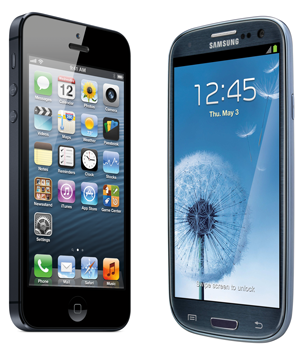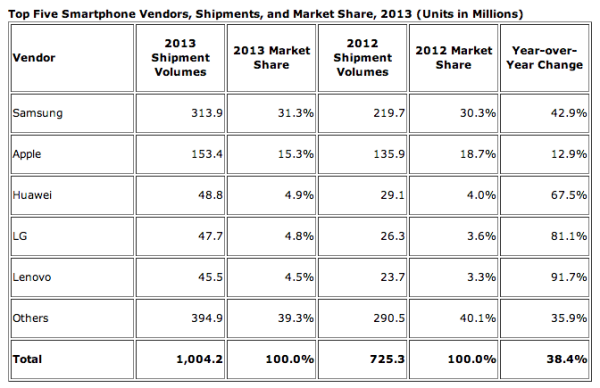1 Billion Smartphones: Samsung On Top But China Rising
Samsung finished 2013 as the undisputed global smartphone leader, increasing its marketshare lead over arch-rival Apple. However Chinese handset makers such as Huawei and Lenovo gained ground on the Korean giant. Propelled by lower-cost handsets in emerging markets, global smartphone shipments hit or exceeded a billion units according to Strategy Analytics and IDC (their numbers disagree). According […]
 Samsung finished 2013 as the undisputed global smartphone leader, increasing its marketshare lead over arch-rival Apple. However Chinese handset makers such as Huawei and Lenovo gained ground on the Korean giant.
Samsung finished 2013 as the undisputed global smartphone leader, increasing its marketshare lead over arch-rival Apple. However Chinese handset makers such as Huawei and Lenovo gained ground on the Korean giant.
Propelled by lower-cost handsets in emerging markets, global smartphone shipments hit or exceeded a billion units according to Strategy Analytics and IDC (their numbers disagree). According to the IDC data Apple maintained its number two position (Strategy Analytics says Apple is number three).
Samsung had nearly one third of the global smartphone shipments market. Apple captured roughly 15 percent, which was down from nearly 19 percent last year (despite higher unit shipments).

Source: IDC
Compare global web traffic by mobile operating system, via StatCounter:
- Android: 40 percent
- Apple: 32 percent
- BlackBerry: 3 percent
- Windows Phone: 2 percent
- Others: 23 percent
Despite Samsung’s global smartphone leadership the company recently missed its quarterly revenue targets, under pressure in emerging markets from second-tier smartphone makers. This creates a dilemma: does Samsung produce cheaper handsets and sacrifice profitability to maintain share?
For its part Apple has been unwilling to go “down market.” The company displayed that resistance again during its quarterly earnings call yesterday. Cupertino’s effort at a lower-cost iPhone, the 5c, was largely as failure. Most financial analysts and investors are concerned that Apple’s apparent unwillingness to forgo some profit to attract new users is a threat to the company’s position in the smartphone market long term.
In some respects Samsung may turn out to be the more vulnerable company. Lower priced Chinese Android handsets could win in developing markets (where the current iPhone doesn’t really have a chance anyway). And a larger-screen iPhone 6 could attract more affluent buyers who today choose Samsung devices not primarily for the Android OS but for the larger screen hardware.
Contributing authors are invited to create content for MarTech and are chosen for their expertise and contribution to the search community. Our contributors work under the oversight of the editorial staff and contributions are checked for quality and relevance to our readers. MarTech is owned by Semrush. Contributor was not asked to make any direct or indirect mentions of Semrush. The opinions they express are their own.
Related stories